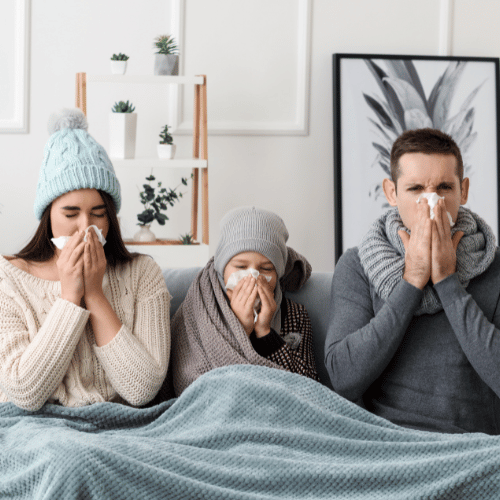
Medical Weight Loss Explained
A lot is said about medical weight loss but we are here to debunk the myths for you.
Conditions > Flu
Influenza, commonly known as the flu, is a contagious respiratory illness caused by influenza viruses.
It can lead to mild to severe illness and, at times, can result in hospitalisation.
Unlike the common cold, the flu tends to come on suddenly and can cause a range of symptoms that impact daily life.




Contrary to popular belief, the flu is not the same as the common cold. They are caused by different groups of viruses, with flu symptoms typically appearing more suddenly, lasting longer, and being more severe.
Flu symptoms usually develop within 1 to 3 days of infection and can persist for a week or more. They may be severe enough to leave you feeling too exhausted and unwell to carry out your usual daily activities. Even after the infection improves, lingering symptoms such as a cough or ongoing fatigue may persist.
In contrast, symptoms of a cold are usually milder and include a runny or stuffy nose, sneezing, sore throat, and a mild cough. Complications from a cold are less common but can include sinus infections or middle ear infections.
The main symptoms of the flu typically include:


Symptoms usually appear suddenly and can range from mild to severe. If you are experiencing flu symptoms, it is a good idea to consult with a healthcare provider. While many cases of the flu can be managed at home with rest and fluids, certain symptoms warrant seeking medical attention immediatley.
For instance, if you experience difficulty breathing or shortness of breath, persistent chest pain or pressure, severe or ongoing vomiting, confusion or sudden dizziness, or a high fever that does not improve with medication, it is important to consult a healthcare provider.
Typical treatments for the flu include antiviral medications, which can help reduce the severity and duration of symptoms if taken within the first 48 hours of illness.
Additionally, getting plenty of rest and staying hydrated are crucial for helping your body recover.
Over-the-counter medications, such as pain relievers and decongestants, can also alleviate symptoms like fever and aches.


To protect yourself and others from the flu, consider these preventive measures:
Influenza viruses, particularly types A and B, are the culprits behind the flu.
These viruses spread from person to person through tiny droplets that are expelled when someone with the flu coughs, sneezes, or talks.
The droplets can be inhaled by those nearby, leading to infection.


The flu virus can survive on various surfaces for a period of time.
When you touch a contaminated surface or object and then touch your face, especially your mouth, nose, or eyes, the virus can enter your body and cause an infection.
This form of transmission underscores the importance of regular handwashing and avoiding touching your face.
Come and see us if you are feeling unwell. We can help you figure out the best course of treatment for influenza and can offer advice about vaccination if necessary. Give us a call or use our online booking system to make an appointment.
We work with experienced consultants & healthcare professionals who have received positive feedback from our patients, and with whom we have established long-term relationships.
Use our online booking engine or book your test by giving us a call.
On the online booking engine select the “appointment type” you need.
You will be seen by one of our friendly doctors or trained clinicians.
Latest Episode
Tune in to our podcast to explore the world of healthcare and learn from distinguished special guests. We cover everything from preventative measures to cutting-edge treatments so that you can stay informed and up-to-date on health-related things.

A lot is said about medical weight loss but we are here to debunk the myths for you.

This is Kate’s story. She visited us last year and saw great improvements in her health and quality of life.

Regular sexual health testing is a vital part of responsible wellbeing, helping protect yourself, and your partners.
Subscribe for latest updates & news


From same-day private GP and blood test appointments to visa medicals, a sexual and reproductive health clinic, and preventative health screenings, we are here to help.
Contact Us
Accepted Insurance Companies






Please note that Walk-in Clinic is a private medical centre & not an NHS service. Harley Walk-in Clinic Ltd company registration no. 07472804